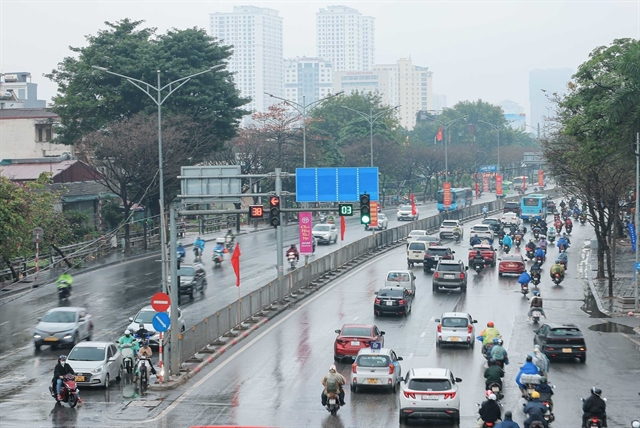 Politics & Law
Politics & Law

 |
| National Assembly Vice Chairwoman Nguyễn Thị Thanh speaks at the plenary session of the 15th NA’s 10th meeting on Monday. VNA/VNS Photo |
HÀ NỘI — National Assembly (NA) deputies on Monday agreed on the necessity of promulgating the Law on Population, proposing that all women with two children, regardless of age, should be eligible for population policy benefits.
The proposal is seen as a key measure to help Việt Nam maintain its replacement fertility rate.
The discussion took place during a plenary session of the 15th NA’s 10th meeting, under the chairmanship of NA Vice Chairwoman Nguyễn Thị Thanh, who also presided over deliberations on the draft Law on Disease Prevention.
In her opening remarks, Thanh urged NA deputies to focus their comments on several major issues under the draft Population Law, including maintaining the replacement fertility rate, reducing gender imbalance at birth and developing policies to adapt to population ageing.
For the draft Law on Disease Prevention, she asked NA deputies to evaluate whether the proposed provisions align with the Party’s guidelines, particularly for breakthrough, strategic measures and ensuring consistency and coordination with other relevant laws and international treaties.
She also emphasised the need to assess resource feasibility and the capacity of local health systems, especially in ethnic and mountainous areas.
During the discussion, Deputy Tô Văn Tám from Quảng Ngãi Province expressed his support for the necessity of enacting the Population Law.
Commenting on Article 13 of the draft, which states that women who have two children before the age of 35 are eligible for financial support, he said the wording could be understood to exclude women who give birth after 35 from receiving such support.
“We believe this provision should be reviewed carefully,” Tám said. “It may be intended to encourage childbirth at reproductive age to ensure a future population, but as it stands, it remains somewhat unreasonable.”
He proposed revising the clause to ensure that financial and policy support applies to all women who have two children, without an age restriction.
Tám also suggested expanding participation in population policy implementation. While current regulations assign primary responsibility to State authorities, he proposed involving employers in agencies, organisations and enterprises, who would also help support and create favourable conditions for workers to fulfil population policy goals.
Referring to prohibited acts listed in Clause 4, Article 16, which bans “coercing, forcing, encouraging, persuading, or advising abortion for reasons of sex selection”, he called for clearer wording, stressing that all forms of coercion or compulsion must be strictly prohibited.
Sharing her views on the draft Law on Disease Prevention, Deputy Trần Khánh Thu from Hưng Yên Province said the latest draft incorporated more scientific and practical provisions. Notably, it added a clause on periodic health check-ups and health screening, consistent with international health regulations.
She said the draft comprehensively summarised the State’s preventive health policies, including the modernisation of the preventive healthcare system as stated in Clause 4, Article 3. However, she proposed clarifying the roles and responsibilities of commune-level health centres to enhance implementation effectiveness.
Thu also recommended adding a principle to Clause 2, Article 34, ensuring that all citizens have equal access to nutrition and food to achieve optimal health. She emphasised the importance of promoting rational and locally appropriate nutrition practices to improve health, reduce disease burden and enhance the physical and intellectual capacity of the Vietnamese population.
As for mental health, she welcomed the draft’s inclusion of early detection and community-based management, describing it as a positive and forward-looking step towards comprehensive healthcare. Still, she recommended that the law specify key risk factors to help identify target groups and guide the design of preventive interventions.
At a press conference on November 7, Lê Thanh Dũng, Director General of the General Department of Population under the Ministry of Health, announced that Việt Nam would be the first country in the world to develop and adopt a Population Law.
According to Dũng, the law will establish a comprehensive and unified legal framework to institutionalise the Party’s guidelines and policies on population, address existing limitations and meet the demands of population and development work in the new era.
The draft law was developed by inheriting and revising the 2003 Ordinance on Population, retaining 10 articles, amending one and abolishing 26 to better align with current realities.
The Ministry of Health has also added 15 new provisions covering communication, advocacy and education on population issues; adjustments to population size, structure and distribution; and measures to ensure the effective implementation of population policies, among other topics. — VNS




